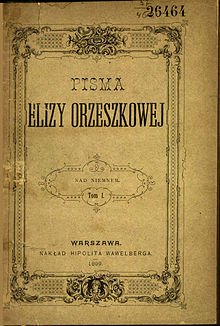- Nad Niemnem
-
Nad Niemnem is a Positivist novel written by Eliza Orzeszkowa in 1888 during the foreign Partitions of Poland.[1] Its main purpose was to present the Polish society and its own internal dynamics as they were in mid–18th century, in reference to the Polish January Uprising against the Russian occupation.[2] The novel first appeared in installments on the pages of Tygodnik Ilustrowany in 1887 and was published as a book in 1888.
First the author planned to limit the plot to a love story between Jan, a villager from the lower classes, and Justyna, who comes from a wealthy aristocratic family. However, while writing, the background relating to customs started to develop which made the author give up the original title: Misalliance.
Nad Niemnem is set in and around the Polish county of Grodno after the 1863 January Uprising. The title means "Upon the Niemen" - the Niemen being a river now situated in modern Byelorussia and Lithuania.
Contents
Main characters
- Bohatyrowicz family (Anzelm, Janek, Fabian) – their lifestyle is elegant, not to say festive, very seldom coarse. In the language they use lots of proverbs, sayings, rhymes and aphorisms appear. The Bohatyrycz family cultivates also the folk songs which contrast with the behavior of the Korczyńscy family which lives in the manor house, where singing seems to be inappropriate. The other cultural heritage they cherish is duration of some kind of social order regulated by specific behaviour, gestures and relations between neighbours. They avoid formalism and stiffening of customs. Their religiousness is based on obeying the Ten Commandments rather than God-fearing practices. (Orzeszkowa did not put the emphasis on Polish Catholicism and deprived her fictitious village of a priest).
- Benedykt Korczyński – his characteristic feature is bitterness (caused by the adversities of fate, choices between evil and evil, fight for patrimony with the occupant etc.) and loneliness. He fenced himself off from the Bohatyryczes because they were the first to bring an action against him, that was the reason of their mutual dislike. The only person he can rely on is Marta.
- Witold Korczyński – he is an univocally positive hero; symbolises young people who draw conclusions from the past and believe in the rebirth of the nation. At the same time he is a colourless and conventional character. In all the conflicts with his father he is always the one that is right.
- Remaining characters: Teofil Różyc, Andrzejowa Korczyńska, Zygmunt Korczyński, Marta Korczyńska, Emilia Korczyńska, Bolesław Kirło, Maria Kirłowa, Justyna Orzelska, Jadwiga Domuntówna.
Motifs appearing in the novel
- January uprising – introduced to the novel through the motif of a common mound of 40 insurgents situated in the middle of the forest. The area belongs to the Korczyńscy family. The insurgents are strongly idealised, the problem of their division into “whites” and “reds” is barely mentioned in the novel, on the other hand, however, there is also no pondering of the rebels’ mistakes or questions concerning the peasantry’s attitude towards the uprising. Emilia Korczyńska, Teresa Pilińska, Bolesław Kirło, Ignacy Orzelski, Deneccy, Teofil Różyc are the people that have no interest in the tomb because they do not commemorate the memory of people who died there. From the above mentioned, only Teofil is brave enough to ridicule them during the conversation with his mother.
- Misalliance – introduced to the work mainly through the legend of Jan and Cecylia . That particular misalliance was “blessed” by the national authority. The marriage of Jan and Justyna is the repetition of the mythical model. The third misalliance appearing in the book is the marriage of Witold and Marynia Kirlanga, the fourth – marriage of Andrzejowa Korczyńska and the last one – marriage of Ładyś Bohatyrowicz with a peasant woman.
- The lack of books in the novel. There are almost no books mentioned in the work, only Anzelm keeps three books: Pan Tadeusz, David's Psalter and Ogrody Północne. Those are copies that he received from Andrzej Korczyński a couple years earlier. Selection of those three titles has a great didactic function for the readers.
Adaptations
The novel has been adapted twice for film, in 1939 and again in 1986. The 1986 film led to a 1988 television miniseries.
See also
Notes and references
- ^ "Eliza Orzeszkowa" from the Encyclopædia Britannica. Retrieved September 22, 2011.
- ^ Prof. dr hab. Józef Bachórz, Eliza Orzeszkowa. Virtual Library of Polish Literature. Retrieved September 22, 2011.
- Analysis of the book (Polish)
Categories:- Polish novels
Wikimedia Foundation. 2010.

